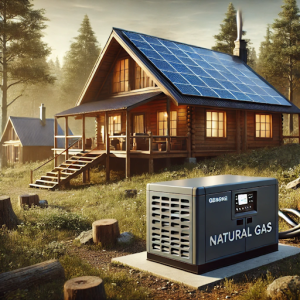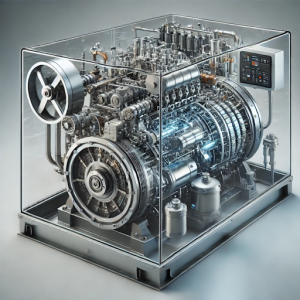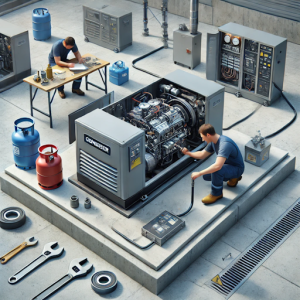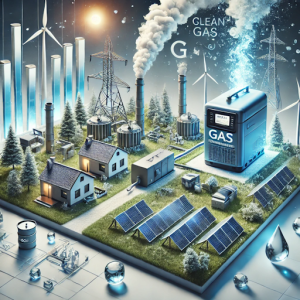
Natural Gas Generators: Your Solution for Off-Grid Power
Explore the Benefits of Natural Gas Generators for Sustainable Off-Grid Living
Natural gas generators are an exceptional choice for individuals seeking a reliable and efficient power source for homes or cabins located in remote areas. Understanding the various methods of power generation is crucial as you embark on your off-grid journey. The distinctive advantages of natural gas generators, such as their impressive reliability, cost-effectiveness, and eco-friendly attributes, make them a popular option for off-grid living enthusiasts who prioritize sustainability and operational efficiency. Embracing these generators can significantly enhance your ability to live independently while minimizing your environmental footprint.
In an increasingly tech-driven world, the appeal of off-grid living has captured the hearts of many. Whether motivated by a commitment to sustainability, a quest for independence, or the desire for a self-sufficient lifestyle, disconnecting from the traditional power grid can be profoundly fulfilling. Off-grid energy solutions empower you to harness energy from renewable resources or alternative fuels, creating a comfortable living experience that is independent of conventional electricity sources and enhancing your overall quality of life.
By equipping yourself with essential knowledge and preparation, you can seamlessly integrate a natural gas generator into your off-grid lifestyle, ensuring that your vital needs are consistently met with a dependable power supply. This article will explore the numerous advantages of natural gas generators, explain their operating mechanisms, and outline important considerations when choosing and installing them for your off-grid setup.
 Maximize Your Off-Grid Energy Options with Essential Knowledge
Maximize Your Off-Grid Energy Options with Essential Knowledge
- Off-grid energy solutions liberate you from traditional energy sources, making them essential for remote living and during unexpected power outages.
- Natural gas generators provide reliable and efficient energy production, significantly reducing emissions compared to diesel or gasoline alternatives.
- These generators operate by combusting natural gas to generate mechanical energy, which is then transformed into electrical energy through a generator system.
- When choosing a natural gas generator, it’s critical to evaluate factors such as power output, fuel efficiency, and maintenance requirements to ensure optimal performance and longevity.
- Proper installation and regular maintenance are vital for the safe and efficient operation of your natural gas generator, ensuring it meets your energy needs reliably.
Discover the Exceptional Advantages of Natural Gas Generators for Reliable Energy
A key advantage of natural gas generators is their unparalleled reliability. By selecting a natural gas generator to fulfill your off-grid energy requirements, you can expect a stable power supply tailored to your specific needs. Unlike solar panels or wind turbines, which can be negatively affected by unpredictable weather conditions, natural gas generators deliver consistent energy output that remains unaffected by external variables. This dependability is crucial for individuals who rely on electricity for essential tasks such as heating, refrigeration, or operating medical devices.
The assurance that your generator will provide power when needed most offers peace of mind, especially in critical situations. In addition to their reliability, natural gas generators also present significant cost savings. Although the initial investment might be higher than some alternative off-grid options, the long-term savings can be substantial. Natural gas is typically cheaper than gasoline or diesel, leading to lower operating costs over time.
Moreover, the maintenance requirements for natural gas generators are generally less demanding than those of other generator types, allowing you to conserve both time and resources while enjoying a steady and reliable energy source that supports your off-grid lifestyle.
 Unlocking the Mechanics Behind Natural Gas Generators
Unlocking the Mechanics Behind Natural Gas Generators
Natural gas generators operate by converting the chemical energy found in natural gas into electrical energy through a combustion process. When the generator is activated, natural gas is mixed with air and ignited inside the engine’s combustion chamber. This ignition creates high-pressure gases that drive the engine’s pistons, which in turn rotate the rotor of the generator to produce electricity, showcasing an efficient and effective energy generation method.
This operational method is particularly noteworthy for its efficiency, as it produces cleaner emissions compared to other fossil fuel options. A crucial component of a natural gas generator is its fuel system, which typically includes a regulator to manage gas flow and ensure peak performance. Many modern natural gas generators come equipped with advanced features such as automatic start/stop functions and remote monitoring capabilities, greatly enhancing user convenience.
These technological advancements allow for better energy management, making it easier to monitor your power supply and simplify your off-grid lifestyle, thus enhancing your overall living experience.
Essential Factors to Consider When Choosing Your Natural Gas Generator
| Consideration | Description |
|---|---|
| Power Output | Calculate the generator’s required power output based on the specific appliances and equipment you intend to operate. |
| Fuel Type | Opt for natural gas as your fuel choice, given its clean-burning and cost-effective characteristics. |
| Size and Portability | Select a generator size and portability that align with your available space and mobility requirements. |
| Noise Level | Assess the generator’s noise output to ensure it meets acceptable standards for your living environment. |
| Start-up Mechanism | Choose between manual or automatic start-up options based on your convenience and usage frequency. |
When selecting a natural gas generator for your off-grid setup, several essential factors must be thoroughly evaluated. First, assess your power requirements. Accurately calculate the total wattage necessary to support your essential appliances and devices, ensuring that the generator you choose can effectively handle this load.
It is advisable to select a generator with slightly higher capacity than your calculated needs to accommodate any unexpected increases in power demand. Another important aspect to consider is the generator’s portability and installation requirements. If you plan to move your generator frequently or use it in different locations, opt for a lightweight and easily transportable model.
Additionally, think about whether you prefer a stationary installation or a portable unit that can be set up conveniently according to your needs. Lastly, consider the generator’s noise level; quieter models can significantly enhance your off-grid experience by minimizing disturbances and preserving the tranquility of your natural surroundings, contributing to a more enjoyable living environment.
 Essential Installation and Maintenance Practices for Natural Gas Generators
Essential Installation and Maintenance Practices for Natural Gas Generators
The installation of a natural gas generator demands meticulous planning and execution to ensure both safety and efficiency. Begin by selecting an appropriate location for your generator, making sure to comply with local regulations and safety guidelines. Ideally, this site should be well-ventilated and distanced from flammable materials to mitigate potential hazards.
You may also need to create a concrete pad or platform to stabilize and protect the generator from moisture-related damage, which could impact its performance. After establishing the ideal location, connect the generator to your natural gas supply line. If you lack experience with gas line installations, it’s advisable to seek professional assistance to ensure compliance with all safety standards and regulations.
Once the fuel connection is established, set up the necessary electrical connections to integrate the generator with your home’s electrical system. Regular maintenance is crucial for keeping your generator running smoothly and efficiently. Routine checks on oil levels, air filter replacements, and spark plug inspections are all essential to maintain optimal performance and extend the lifespan of your generator.
Comprehensive Cost Analysis: Natural Gas Generators vs. Other Off-Grid Energy Solutions
When evaluating the costs associated with off-grid energy solutions, it is vital to conduct a thorough comparison between natural gas generators and alternative options, such as solar panels and diesel generators. While solar energy systems have gained popularity due to their renewable nature, they often require a significant initial investment in panels, batteries, and inverters. Furthermore, solar systems may struggle to provide adequate power during cloudy days or at night without sufficient battery storage, which can add to overall costs.
On the other hand, diesel generators are known for their reliability, but they typically come with higher fuel costs and more frequent maintenance needs compared to natural gas generators. Given the price fluctuations of diesel fuel, natural gas often presents a more stable and economical option in many regions. A long-term expense analysis indicates that natural gas generators generally offer a more cost-effective solution for those pursuing off-grid living while maintaining energy independence.
 Evaluating the Environmental Impact of Natural Gas Generators in Off-Grid Living
Evaluating the Environmental Impact of Natural Gas Generators in Off-Grid Living
As you explore various off-grid energy options, it is essential to assess their environmental impact. Natural gas is often regarded as a cleaner alternative to other fossil fuels such as coal or oil, primarily due to its lower carbon emissions during combustion. By opting for a natural gas generator, you can significantly minimize your carbon footprint while enjoying reliable power for your off-grid lifestyle, aligning with eco-conscious practices.
However, it is crucial to acknowledge that natural gas remains a fossil fuel, and its extraction can pose environmental challenges. Methane leaks during the extraction and transportation phases present significant issues regarding greenhouse gas emissions. To mitigate these concerns, prioritize sourcing natural gas from reputable suppliers committed to sustainable practices and environmental stewardship.
Additionally, integrating renewable energy sources alongside your natural gas generator can further demonstrate your commitment to sustainability and responsible energy consumption, creating a balanced and environmentally-friendly energy system.
Inspiring Real-Life Success Stories of Off-Grid Living with Natural Gas Generators
Examining real-world examples can provide valuable insights into how natural gas generators have been effectively utilized in off-grid living scenarios. For instance, many rural homeowners have transitioned to natural gas generators as their primary energy source after experiencing frequent outages from traditional utility services. This shift has empowered them to achieve energy independence while ensuring a consistent electricity supply for heating, cooling, and essential appliances.
Another notable case involves remote cabins that rely on natural gas generators for seasonal use. Given their isolated locations, these cabins often lack access to conventional power sources. Natural gas generators allow cabin owners to enjoy modern conveniences such as refrigeration and lighting without sacrificing their connection to the natural environment, enhancing their overall off-grid experience.
These success stories illustrate how natural gas generators can effectively support off-grid living, providing both comfort and reliability. As you embark on your journey toward off-grid living, consider the extensive benefits that natural gas generators offer. From their reliability and cost-effectiveness to their relatively low environmental impact, these generators can play a pivotal role in achieving energy independence and sustainable living.
By carefully selecting the appropriate model for your needs and adhering to proper installation and maintenance practices, you can seamlessly transition into an off-grid lifestyle powered by natural gas, ensuring that your energy needs are consistently met while enjoying the advantages of independent living.
Addressing Common Questions About Natural Gas Generators
What defines a natural gas generator suitable for off-grid living?
A natural gas generator designed for off-grid applications is a power generation system that utilizes natural gas as a fuel source to generate electricity in remote areas where access to the main power grid is limited or unavailable.
How does a natural gas generator operate in off-grid settings?
A natural gas generator intended for off-grid use combusts natural gas within an internal combustion engine. This combustion process generates mechanical energy, which is converted into electrical energy through a generator. The electricity produced can power various appliances, equipment, and lighting in off-grid environments, providing essential services to remote living spaces.
What are the primary advantages of using a natural gas generator for off-grid living?
The key benefits of utilizing a natural gas generator for off-grid living include:
– Lower fuel costs compared to diesel or gasoline generators
– Cleaner combustion leading to reduced emissions and a smaller environmental footprint
– Continuous fuel supply sourced from natural gas pipelines
– Lower maintenance requirements relative to other fuel types, making it a practical choice for off-grid applications.
What critical factors should be considered when using a natural gas generator for off-grid living?
Important considerations when employing a natural gas generator in off-grid scenarios include:
– Availability of a natural gas supply in your area
– Initial installation and equipment costs
– Regular maintenance and servicing needs
– Environmental implications and compliance with emissions regulations, ensuring sustainable practices.
Is a natural gas generator suitable for both residential and commercial off-grid applications?
Natural gas generators designed for off-grid use are suitable for both residential and commercial applications. They are frequently employed in remote homes, cabins, farms, and small businesses that lack connectivity to the main power grid, providing essential energy solutions.
The post Natural Gas Generators for Off-Grid Power Solutions appeared first on Survival Bite.
The Article Natural Gas Generators: Your Off-Grid Power Solution Was Found On https://limitsofstrategy.com
The Article Natural Gas Generators as Your Off-Grid Power Source First Appeared ON
: https://ad4sc.com












I truly appreciate the insights you’ve shared about natural gas generators in the context of sustainable off-grid living. The way you highlight the blend of reliability, efficiency, and eco-friendliness really resonates with me, especially as I’ve been exploring alternative energy sources for a more self-sufficient lifestyle myself.